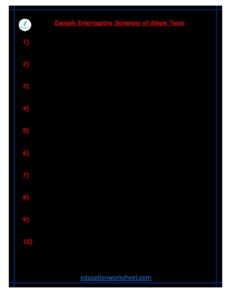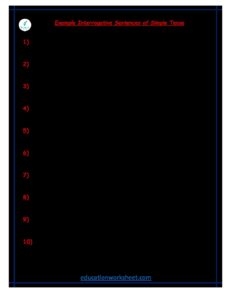Simple Tense interrogative examples
Simple Tense interrogative examples
Simple tense interrogative sentences, also known as question sentences, are used to inquire about a specific piece of information, seek clarity, or stimulate a conversation. These questions can be formed in various tenses, depending on the time frame or context you wish to discuss. The three primary tenses in English are the present, past, and future tenses, each serving different purposes and carrying distinct structures when used in interrogatives.
Let’s begin by examining interrogative sentences in the present tense. The present tense is used to describe actions that are happening right now, habitual actions, or general truths. Interrogatives in the present tense are typically formed by inverting the auxiliary verb ‘to do’ (do/does) with the base form of the main verb.
Present Simple Interrogative:

-
- Do you like chocolate ice cream?
- Does she speak Spanish fluently?
- Are they coming to the party tonight?
These questions are designed to gather information about current actions or habitual activities in the present. By using interrogatives, we can engage in discussions and gather insights into people’s preferences, abilities, or plans.
Moving on to the past tense, this tense is employed to discuss actions or events that have already occurred. Interrogatives in the past tense involve inverting the auxiliary verb ‘to do’ (did) with the base form of the main verb.
Past Simple Interrogative:
-
- Did you visit Paris last summer?
- Where did he go for his vacation?
- Did they enjoy the movie yesterday?
These questions are essential for delving into past events, experiences, or actions. They help us understand and share personal histories and experiences, as well as learn about the past actions of others.
Finally, let’s explore the future tense, which is used to discuss actions or events that will occur in the future. Forming interrogatives in the future tense involves using auxiliary verbs like ‘will’ or ‘shall’ to indicate future actions.
Future Simple Interrogative:

-
- Will you attend the conference next week?
- What will she do after graduating?
- Shall we meet at 3 PM tomorrow?
Questions in the future tense are crucial for planning, making predictions, and discussing future intentions and events. They enable us to organize our schedules, make commitments, and speculate about what lies ahead.
In addition to these fundamental tense categories, interrogative sentences can be further classified into yes-no questions and wh-questions. Yes-no questions seek a simple affirmative or negative response, while wh-questions seek detailed information about a particular aspect of the question.
Yes-No Questions:
-
- Do you like coffee?
- Will she be there on time?
- Did they visit the museum?
Yes-no questions are designed to solicit straightforward answers such as ‘yes’ or ‘no.’ They are versatile and can be used in various tenses to inquire about opinions, predictions, or facts.
Wh-Questions:
-
- What time is it?
- Where did you go on your vacation?
- Why are they upset?
Wh-questions are more detailed and seek specific information about the question word, which can be ‘what,’ ‘where,’ ‘why,’ ‘who,’ ‘whom,’ ‘which,’ ‘whose,’ ‘when,’ or ‘how.’ These questions encourage more extensive responses, allowing for deeper conversations and a better understanding of the topic at hand.
The significance of simple tense interrogatives in communication cannot be overstated. They serve multiple functions, including seeking information, clarifying doubts, starting conversations, and encouraging engagement. Interrogatives facilitate effective communication in both spoken and written language, making them an indispensable part of human interaction.
In spoken language, interrogatives are used in everyday conversations, interviews, debates, and discussions. They help people express their curiosity, share ideas, and engage in meaningful dialogues. Consider how often you use questions to chat with friends, seek help, or participate in group discussions.
Simple Tense interrogative examples

In written language, interrogatives are prevalent in various forms of literature, including fiction, non-fiction, and poetry. Authors use interrogative sentences to convey character emotions, build suspense, and provoke critical thinking in readers. Think about how a novel might use a series of questions to engage the reader’s imagination or how a persuasive essay might employ questions to stimulate reflection.
In educational contexts, interrogatives are vital for both teachers and students. Teachers use questions to assess students’ understanding, encourage critical thinking, and guide discussions. Students, in turn, use questions to seek clarification, express their doubts, and actively participate in the learning process.
Interrogatives also play a significant role in journalism. Journalists use questions to gather information, conduct interviews, and write news articles. Through well-crafted questions, they can uncover facts, elicit responses from interviewees, and present balanced and informative news reports.
Moreover, the use of interrogatives extends beyond interpersonal communication. In the world of technology, virtual assistants like Siri, Google Assistant, and Alexa rely on interrogative input to provide accurate responses to user queries. The ability to ask questions to a machine has revolutionized the way we access information, conduct searches, and perform tasks.
In the field of research, scientists and scholars use interrogatives to formulate hypotheses, design experiments, and gather data. The scientific method itself is founded on asking questions and seeking answers. Questions drive the pursuit of knowledge and understanding in various academic disciplines.
Business and marketing also rely heavily on interrogatives. Marketers use questions to survey customer preferences, conduct market research, and develop targeted advertising campaigns. Business leaders ask questions to make informed decisions, assess market trends, and solve problems.

